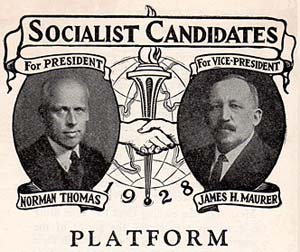Biden/Harris America
How the Socialist Party platform of 1928 worked its way into American political policy.
|
"The American people will never knowingly adopt Socialism. But under the name of 'liberalism' they will adopt every fragment of the Socialist program, until one day America will be a Socialist nation, without knowing how it happened."
- Often attributed to Norman Thomas (1884-1968), six-time U.S. Presidential candidate for the Socialist Party of America
|
 (click to read entire platform) |
( NOTE: It is the intention of CrystalBull.com to remain politically independent, and not become mired in partisan politics. Our mission is to study the world economy, and in that mission, at times, the relationship between politics and economics becomes highly relevant. This is an important time for this commentary. Whether the reader is liberal or conservative, Democrat or Republican, we believe this is of interest to all investors. These observations were first made by economists (Nobel Laureate) Milton and Rose Friedman, in Free to Choose in 1979, but have been updated here. Thankfully, we have been spared the brutality of a Joseph Stalin, though many of the economic principles of his early years have crept into American life.)
Let's set the stage... The year is 1928. World War I ended ten years ago, but its effects and settlements have left much of the world in dire straits economically. The National Socialist German Workers' Party (Nazi) is gaining power in an economically-destitute Weimar Germany. Benito Mussolini and the National Fascist Party are firmly entrenched in Italy. The Bolshevik Revolution, where first the peasants, then Vladimir Lenin and the Bolshevik Party wrested power from the czars in Russia, is now a decade in the past. Joseph Stalin has built a "cult of personality" in Russia, using mass media to create an idealized and heroic public image through unquestioned idolatry, flattery, and praise.
The propaganda machines of both Stalin's Socialism and Mussolini's Fascism are in full swing, painting rosy pictures of life under government control. Franklin Delano Roosevelt is campaigning to become governor of New York. The cocktail parties of Upper Manhattan are abuzz with chatter about the foreign rulers. In fact, a year earlier, future members of FDR's "Brain Trust" (mostly professors at Columbia University) went on a junket to Russia to meet with Stalin, and came back in admiration and awe. One Brain Trust member, Stuart Chase, went on to write a very prophetic book, The New Deal, which laid the groundwork for the social programs of the FDR administration. The last sentence of The New Deal reads, "Why should Russians have all the fun remaking a world?"
The U.S. economy is strong. Life is good, but the "roaring 20's" are about to come to an end.
In the 1928 election for President of the United States, Norman Thomas and James Maurer ran on the Socialist Party ticket. They captured only one percent of the vote, but laid out a vision for what Socialism meant in the early part of the 20th century. The planks of the Socialist Party platform were clearly defined. It is fascinating that in just a few decades, most of the planks of the 1928 Socialist Party platform would be enacted into law, without the party ever winning an election. Thomas finally quit American politics, stating that he was no longer needed, as the Democrat and Republican parties had adopted every plank in the platform. He said, "The difference between Democrats and Republicans is: Democrats have accepted some ideas of Socialism cheerfully, while Republicans have accepted them reluctantly".
Here are the economic planks of the Socialist Party platform of 1928, with editorial comment added (Click to read entire platform):
1. "Nationalization of our natural resources, beginning with the coal mines and water sites, particularly at Boulder Dam and Muscle Shoals." (Boulder Dam, renamed Hoover Dam, and Muscle Shoals are now both federal government projects.)
2. "A publicly owned giant power system under which the federal government shall cooperate with the states and municipalities in the distribution of electrical energy to the people at cost..." (Tennessee Valley Authority, et al. This is a generally accepted process across the country. Even the private utilities are highly regulated.)
3. "National ownership and democratic management of railroads and other means of transportation and communication." (Railroad passenger service was completely nationalized through Amtrak. Some freight service was nationalized through Conrail. Private railroads are strictly regulated by the federal government. The FCC controls communications by telephone, telegraph, radio, television, and the internet.)
4. "An adequate national program for flood control, flood relief, reforestation, irrigation, and reclamation." (Government expenditures for these purposes are currently tens of billions of dollars per year, including FEMA, Army Corps of Engineers, etc.)
5. "Immediate governmental relief of the unemployed by the extension of all public works and a program of long range planning of public works . . ." (In the 1930s, WPA and PWA were a direct counterpart; now, a wide variety of other programs are.) "All persons thus employed to be engaged at hours and wages fixed by bona-fide labor unions." (The Davis-Bacon and Walsh-Healey Acts require contractors with government contracts to pay "prevailing wages," generally interpreted as highest union wages.)
6. "Loans to states and municipalities without interest for the purpose of carrying on public works and the taking of such other measures as will lessen widespread misery." (Federal grants in aid to states and local municipalities amount to billions of dollars a year. Federal highway funds and many other public works projects.)
7. "A system of unemployment insurance." (Part of Social Security system, as well as the Federal Unemployment Tax.)
8. "The nation-wide extension of public employment agencies in cooperation with city federations of labor." (U.S. Employment Service and affiliated state employment services administer a network of thousands of local employment offices.)
9. "A system of health and accident insurance and of old age pensions as well as unemployment insurance." (Part of Social Security, Unemployment. Universal health insurance coming soon.)
10. "Shortening the workday" and "Securing every worker a rest period of no less than two days in each week." (Legislated by Department of Labor's Wages and Hours Laws that require overtime for working more than eight hours per day or forty hours per week.)
11. "Enacting of an adequate federal anti-child labor amendment." (Child labor provisions under Fair Labor Standards Act.)
12. "Abolition of the brutal exploitation of convicts under the contract system and substitution of a cooperative organization of industries in penitentiaries and workshops for the benefit of convicts and their dependents." (In the 1930's, contract labor was outlawed. After that, rather than making products for private profit, inmates made license plates and other products for government or nonprofit agencies. The Justice System Improvement Act of 1979 loosened regulations to allow prisons to put people to work, provided they paid prevailing wages, consulted unions, and didn't displace workers outside prisons.)
13. "Legislation aiming at the prevention of occupational diseases." (OSHA)
14. "Increase of taxation on high income levels, of corporation taxes and inheritance taxes, the proceeds to be used for old age pensions and other forms of social insurance." (In 1928, highest personal income tax rate, 25 percent; in 2009, 35 percent, current proposals take that above 40%; in 1928, corporate tax rate, 12 percent; in 2009, 35-39% percent with proposed increases; in 1928, top federal estate tax rate, 20 percent; in 2009, 48% with proposed increases.)
15. "Appropriation by taxation of the annual rental value of all land held for speculation." (Not achieved in this form, but property taxes have risen drastically.)
What were shunned as Socialist principles in 1928 are now generally accepted in American life.
If you find this interesting, please use the links below to forward to your friends.

